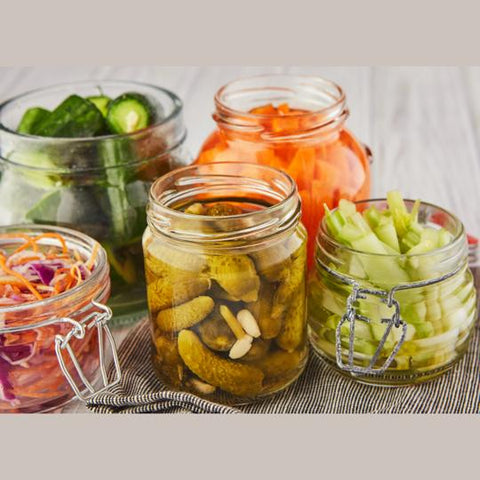Are Fermented Foods good for skin?- Gut Skin Axis -

In recent years, the connection between gut health and overall well-being has gained significant attention. Emerging research has shed light on the intricate relationship between gut health, the microbiome, and various bodily systems, including the skin. One avenue of interest in this field is the potential impact of fermented foods on skin health. In this article, we'll explore the fascinating link between fermented foods and skin conditions, backed by scientific evidence.
The Microbiome and Skin Health:
The human body is host to a vast community of microorganisms, collectively known as the microbiome. This community plays a crucial role in maintaining various physiological functions, including digestion, immunity, and even skin health. The gut-skin axis refers to the bidirectional communication between the gut and the skin, where disturbances in the gut microbiome can potentially manifest as skin conditions.
Fermented Foods and the Gut Microbiome:
Fermented foods are rich sources of probiotics, live beneficial bacteria that can positively influence the gut microbiome's composition and diversity. Studies have shown that a balanced gut microbiome can contribute to healthy skin by reducing inflammation, supporting immune function, and promoting nutrient absorption.
Evidence of Improvement in Skin Conditions:
Research is revealing promising associations between fermented foods and improved skin health. A study published in the journal "Nutrients" (2018) suggested that probiotic supplementation improved skin hydration and reduced the severity of acne lesions. Another study published in the "Journal of Clinical and Aesthetic Dermatology" (2017) explored the potential of probiotics in managing conditions like atopic dermatitis.
The Role of Gut-Skin Axis:
The gut-skin axis involves intricate communication between the gut and the skin through immune signaling and inflammatory pathways. An imbalance in the gut microbiome, known as dysbiosis, can lead to increased inflammation and exacerbation of skin conditions like eczema, acne, and psoriasis.

Fermented Foods and Their Impact:
Fermented foods like kimchi, sauerkraut, kefir, kombucha and fermented green papaya contain beneficial bacteria that can potentially influence the gut-skin axis. Probiotics found in these foods might help maintain a balanced gut microbiome, thereby contributing to healthier skin.
Conclusion:
While the field of gut-skin health is relatively new, it's evident that there's a connection between our internal gut environment and the external appearance of our skin. Incorporating a variety of fermented foods into your diet could potentially promote a well-balanced gut microbiome, leading to improved skin health. As with any health-related matter, individual responses may vary, but the evidence supports the idea that what you eat can indeed influence the health of your skin.
References:
1, Salem, I., Ramser, A., Isham, N., & Ghannoum, M. A. (2018). The gut microbiome as a major regulator of the gut-skin axis. Frontiers in Microbiology, 9, 1459.
2, Fabbrocini, G., Bertona, M., Picazo, Ó., & Piccirillo, M. (2018). Supplementation with Lactobacillus rhamnosus SP1 normalises skin expression of genes implicated in insulin signalling and improves adult acne. Beneficial Microbes, 9(1), 111-115.
3, Huang, R., Ning, H., Shen, M., Li, J., Zhang, J., Chen, X., ... & Xie, Z. (2017). Probiotics for the treatment of atopic dermatitis in children: a systematic review and meta-analysis of randomized controlled trials. Frontiers in Cellular and Infection Microbiology, 7, 392.